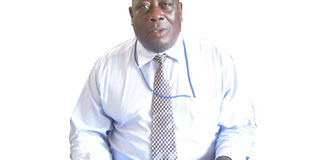Nkumba’s future is bright - Dean of students

David Christopher Kasasa. PHOTO BY BEATRICE NAKIBUKA.
What you need to know:
Interview. David Christopher Kasasa has seen Nkumba University transform from Nkumba College of Commerce and Advanced Studies. For 26 years, the current Dean of Students and institution’s longest serving employee has seen it all, writes BEATRICE NAKIBUKA
What has Nkumba University’s journey been thus far?
The university started as a kindergarten in a local chief’s compound in 1952. It then became a primary school, then Nkumba Secondary School in the 1960’s. The school embraced vocational training and introduced secretarial studies. The addition of accounting courses saw the secondary school evolve into Nkumba College of Commerce and Advanced Studies. The academic offers for the college were based on the East African exams for business studies which enables students compete for jobs elsewhere in East Africa.
On June 18, 1994, the university was launched under the leadership of Prof William Ssenteza Kajubi as the vice chancellor and I was the first dean of students. The number of students then rose to 1,000. I served as the academic registrar and dean of students between 1995- 2001. In 2006, the university received its charter.
When and how did you join the university?
I applied as a lecturer in Business English in 1989 at Nkumba College of Commerce and Advanced Studies. The college then had only 700 students and 80 lecturers. I was in charge of organising social activities like sports and drama. I also took on the responsibility of warden as well as chief invigilator in charge of exams.
What keeps you going as an administrator?
We have a very strong sense of team work as members of staff. There are over 300 members of staff yet we know each other and this keeps us together and helps us deliver.
Was there a time you felt you had to leave Nkumba University?
There has not been such a time. Even when we had a three-day strike by the students last year, we kept our policy of good communication between students, staff and the public.
What makes Nkumba a special place?
The female population stands at 56 per cent. This means that the environment is very conducive for the girl-child to acquire quality higher education. Nkumba University is one of the first chartered private universities which gives students international recognition for both employment and further studies. The university also has a non-broken smoking-free tradition for the many years it has existed.
Nkumba University is the second best sports university after Ndejje. Two of our students played in the national basketball university team at the World University Games in South Korea. We have also excelled at sports like volleyball, basketball, netball, wood ball, soccer, athletics, rugby and chess.
What challenges have you faced and how are you curbing them?
The university has limited space and can only house 900 residential students. The rest reside outside. We usually find it difficult to monitor the ones who reside away from the school premises.
Sometimes the students are just forced to study by their parents so they come here without a clear vision on what they want to do. We, however, carry out orientation to help them decide on what they want to do.
How do you manage indiscipline at the hostels?
The rules are clearly stipulated in the students’ guide. When one fights, they are dismissed immediately. The hostels also have tribunals where they try to settle their cases.
What have been your happiest moments?
On our first graduation in 1998, we had 400 pioneer graduates. That was a very good feeling, not only for me but management and the students. Of course, since then, thousands of other graduates have passed through our able hands. There have been other special moments like when Emmanuel Cardinal Wamala was retiring. We bade him farewell in a special way.
What remarkable contribution have you made to the university?
Together with my team, we are the reason behind Nkumba student’s good discipline. We have received feedback when our students go to the field. I am the person behind the university’s annual cultural festivals that teach the students tolerance for different cultures.
Where do you see the university in the next five years?
The future for this university is bright. I am happy we have a Kampala campus now but we intend to have several other campuses throughout the country and probably in East Africa. We plan to make it an even stronger base for sports and have special training for students in the sports field.




